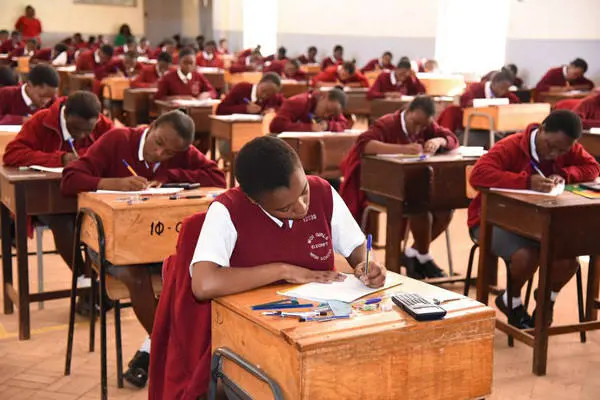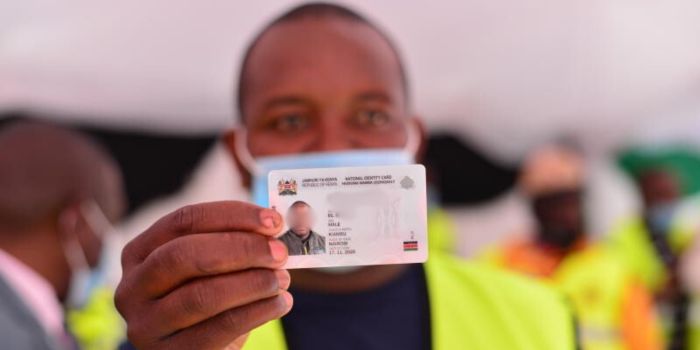All 2024 KCSE candidates to receive Maisha Cards before finishing exams

The Maisha card, which bears the Maisha Namba, is essentially the third generation ID, which has replaced the current second generation ID.
All 2024 Kenya Certificate of Secondary Education (KCSE) candidates will receive Maisha Cards before the end of their exams, Principal Secretary for the State Department for Citizen Services Julius Bitok has announced.
Appearing before the National Assembly Education Committee on Tuesday, Bitok noted that eligible candidates will be issued with National ID cards to facilitate their registration for tertiary education and access to HELB loans and scholarships.
More To Read
- KNEC CEO David Njengere summoned over failure to release withheld KCSE result
- 2025 KCSE concludes smoothly as government reports sharp decline in exam cheating cases
- Education Ministry pledges early capitation release for smooth start to new term
- 19 KCSE exam cheating cases reported across three regions - CS Ogamba
- Five arrested for impersonating students in ongoing KCSE exams
- KCSE exam papers to be airlifted in flood-hit regions - CS Julius Ogamba
“We have mobilised our registration officers across the country to issue Maisha Cards to eligible candidates to enable those who qualify to join local or international universities, apply for Higher Education Loans Board, scholarships, and other post-high school pursuits," Bitok stated.
The Maisha card, which bears the Maisha Namba, is essentially the third-generation ID, which has replaced the current second-generation ID.
It serves as a unique personal identification number assigned to Kenyan citizens upon registration, typically at birth. The number becomes their lifelong personal identity number from birth to death.
For newborns, Maisha Namba also serves as their birth certificate number, facilitating registration in educational institutions (NHIF) and transitioning to an ID number once they reach 18 years of age.
It will also function as their Personal Identification Number (PIN) for accessing various government services, including KRA, NSSF, NHIF, and NEMIS throughout their lifetime. This master database will manage data for all registered citizens, refugees, and foreigners using fingerprint biometric technology, enhancing data accuracy and reliability.
It consolidates existing independent databases into a single integrated register, serving as the central reference for all data related to Kenyan citizens and foreign residents in the country.
The 2024 KCSE candidates represent the largest group ever recorded, with 965,501 students, an increase from 903,138 in 2023. The exams, which began today, October 22, 2024, started with practical and oral tests for elective subjects, ahead of the main written exams set to begin on November 4.
 A Kenyan holds a Maisha Card. (Photo: Interior Ministry)
A Kenyan holds a Maisha Card. (Photo: Interior Ministry)A Kenyan holds a unique identification number card. (Photo: Interior Ministry)
The KCSE exams will conclude on November 22, with the final paper being a physics practical.
President William Ruto extended his best wishes to all candidates sitting for the national KPSEA and KCSE exams. He expressed confidence that the four years of hard work would lead to successful outcomes.
"Best wishes to the 965,000 candidates sitting the KCSE examinations starting today. May their four-year efforts and preparation be rewarded with success," the president said.
He also reassured candidates that the government has taken comprehensive security measures to ensure the smooth running of the exams, with the Ministries of Education and Interior working together to provide invigilators, supervisors, and security personnel at all exam centres.
Furthermore, the Principal Secretary further revealed that a paperless Maisha Card registration process is being piloted in Huduma Centres and National Registration Bureau (NRB) offices at county headquarters to ensure that Maisha cards are issued within ten days.
“We’ve gone paperless. You apply for your ID on the eCitizen portal, then visit any Huduma Centre or NRB county office for your biometrics, which will be relayed in real-time to the NRB headquarters in Nairobi,” he stated.
Members of the committee, led by Julius Melly, sought to know what measures were being implemented to address the delays in issuing ID cards, which candidates joining universities and other tertiary institutions experienced earlier this year.
“We have had a problem obtaining IDs by those who qualify to join universities. Without IDs, they cannot access HELB, loans, or scholarships. How far are you in ensuring students access IDs on time?” posed the Tinderet MP.
However, the PS attributed the delays to several court injunctions that had halted the government from issuing Maisha Cards, resulting in a backlog of 600,000 unprinted cards. He explained that the government had successfully filed for the lifting of those orders and cleared the backlog by investing in a new printer and introducing a 24-hour work schedule.
“Our average daily applications are around 10,000, but we have a total printing capacity of 32,000. So far, we have printed over 1.8 million cards, of which 1.29 million have been collected.” The PS appealed to applicants to collect over 569,000 cards, stating that those whose IDs are ready have already been identified through Short Message Services (SMS).
Responding to MPs’ concerns that loan applicants were experiencing challenges with the application for HELB due to an extra digit on the Maisha Card, the PS noted that the lender’s portal had been reconfigured to ensure compatibility.
Top Stories Today














































